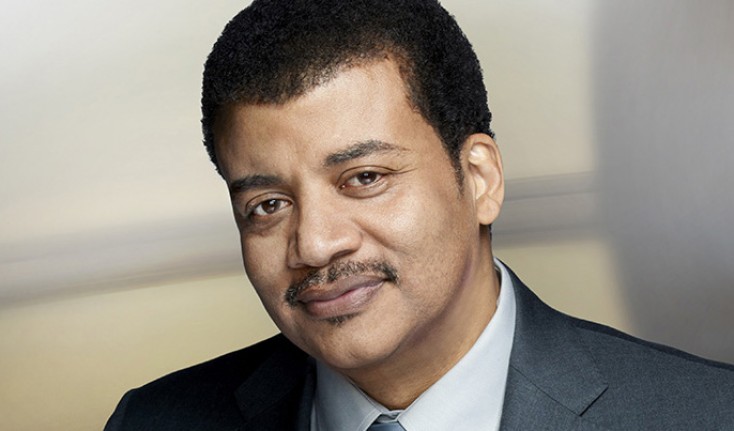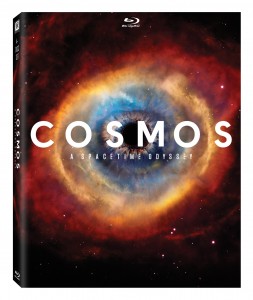By ANGELA DAWSON
Front Row Features
HOLLYWOOD—“Cosmos: A Spacetime Odyssey” wrapped its 13th and final episode Sunday night. Hosted by renowned astrophysicist Dr. Neil deGrasse Tyson, the acclaimed family-friendly science series took viewers on a journey of exploration of the universe for an hour every Sunday night on Fox. The series proved to be a successful experiment in documentary programming during prime time by the network. (It even tied in the ratings with ABC’s “The Bachelorette” during one episode.)
Executive produced by “Family Guy” creator Seth MacFarlane, among others, “Cosmos: A Spacetime Odyssey” was a spectacular follow up to the 1980 award-winning series hosted by astrophysicist and astronomer Carl Sagan that explored the remarkable mysteries of the cosmos and Man’s place within it. Ann Druyan, who co-wrote the original series and was married for many years to Sagan, who died in 1996, worked for seven years to get the follow up series on the air. She credits MacFarlane for convincing the network to take a chance on the documentary series.
Each week, deGrasse Tyson, an acolyte of Sagan’s, would take viewers on a journey across the universe of space and time, bringing to life known and never-before-told stories of the heroic quest of knowledge and a deeper understanding of nature. With it’s big picture Cosmic Calendar, dazzling visual effects, animation and the wondrous Ship of the Imagination, viewers experienced a memorable journey to new worlds and crossed the universe for a vision of the cosmos on a grand and small scale. The producers were unafraid to tackle controversial subjects such as global warming, providing scientific data that proves it is definitely happening. (Ironically, that episode, for whatever reason, had a handful of car sponsors, including Audi, Mazda, Ford and Volkswagen, which seemed contradictory to the anti-carbon emissions message of the show.)
For those not yet ready to depart the Ship of the Imagination, the entire series is available Tuesday, June 10 on Blu-ray and DVD. The Blu-ray contains bonus material that was not aired during the series, as well as a five-part making-of documentary, an audio commentary on the premiere episode and “Cosmos” at Comic-Con.
Just days before the broadcast of the final episode, deGrasse Tyson spoke in a conference call about his experience hosting the series and what he hopes will result from it.
Q: How do you hope to continue bringing that wonder of science to youngsters beyond the series?
deGrasse Tyson: We are learning as a community of scientists and educators that to instill a sense of wonder might be the most important part of the educational effort that we can bring to bear on an audience, be that audience in a classroom or viewers of a television series, and I don’t think it was always thought of that way necessarily. There was the lesson plan, and there are some TV documentaries that are still sort of laid out that way where we have to make sure we cover these curriculum points, and then, it becomes a lesson rather than a journey, a journey of mind and emotion.
Q: With the popularity of this series, you’ve become a rock star. Do you plan to use that popular status to continue educating the public about science in other ways, perhaps either through other science programs that will get kids and families, and just ordinary people to watch, who wouldn’t even think of it, but showing them science in a very interesting, entertaining and thought-provoking way?
deGrasse Tyson: I don’t have specific television ambitions in the sense that I remain fundamentally and academic, and so, my innermost ambitions are what’s the next discovery I can make; that’s in my direct center. Outside of that, the energy for that discovery and the love of doing that work is manifest by my participating in these projects, but it’s not the projects that are in the center of me, it’s sort of the scientific inquiry that’s in my center. So, if another opportunity does not arise, I’m not going to miss it in that sense. If there’s some kind of rock star status, would I be irresponsible if I didn’t somehow use it for a continued greater good? I’m always involved in some way with reaching the public. I have a growingly successful radio show and podcast called StarTalk. It’s weekly in the top 10 of downloads of all podcasts and iTunes. There’s always some book that I’m writing and I’m in the middle of, and so, I’m always there.
Q: What made you want to host this?
deGrasse Tyson: What distinguishes “Cosmos: A Spacetime Odyssey” is when that opportunity arose and I spoke with Ann (Druyan), I realized I felt, whether or not anyone agreed with this, I could present “Cosmos” uniquely. If there’s something that someone else can do, let them do it. If I couldn’t do it uniquely, let someone else do it and I would get back to the lab. But “Cosmos” comes up and it’s like I have this overlap, this sort of culturally genetic intersection with Carl Sagan that I think people would want to know and feel and think about. “Cosmos” came up, and there was no question that I was interested in doing it.
Q: So what’s next?
deGrasse Tyson: I don’t know. I don’t know where I’ll land after “Cosmos,” but there’s always a little piece of me that’s reaching out to the world.
Q: If the Ship of the Imagination were real, where would you go?
deGrasse Tyson: I’d go back and hang out with Isaac Newton. I’m torn between do I hang out with him or do I bring him into the present to hang out with me. See, that might be terrifying because his head will just explode once he sees everything that was derived from his discoveries, but I’d spend more time with someone who I think is one of the most brilliant minds our species has ever known. And then, I’d go back to the Big Bang, of course.
Q: With the DVD and Blu-ray coming out, there’s a lot more material available than you were able to get into the 13 episodes.
deGrasse Tyson: Plus, there’s a making-of feature that should be fun for the viewer.
Q: How do we instill this sense of wonder in young people and get them interested in astrophysics?
deGrasse Tyson: I would say briefly that the urge to think of the next generation, our kids, as our future is obvious. It’s strong and it’s the way that it’s clear and present. However, I’m more inpatient than that. We can train our 12-year olds to make them perfectly scientifically literate, but then we’d have to wait 40 years for one of them to become President and then change the country. It seems to me that if we can somehow transform the adult population, it’ll be clear to them how to then stimulate and promote interest in the people who they’re raising. Right now, the adult class is not even a participant in this sense of wonder that we’re trying to re-instill in the hearts and minds of citizens of the world.
Q: If you were head of the NASA space program, what would you want to focus on?
deGrasse Tyson: I’ve thought long and hard about that, and I realized that if I were head of the space program, I’d be reporting to the President, and so I would have less control than one really might want to have if you have great visions for the space program, and so, also, I wouldn’t think of going into space as the focus—I wouldn’t think of any one destination as a focus relative to another as what happened in the Apollo era where the moon was the focus. If we were ever to become a space-faring civilization, then all of space needs to be considered our backyard, and if it’s our entire backyard, then the moon is one place you go to if that’s where the need takes you. Mars. An asteroid, maybe an asteroid is headed our way, you might want to deflect that when you go visit it. There are things to do in space that we should not be thinking of as one dimensionally in that sense. So, I’d say create a suite of launch vehicles that can be configured for any specific task that scientists, tourists, families, whatever is the—mining, whatever is the activity in space, it is only limited by our imagination and not by somebody’s budget.





